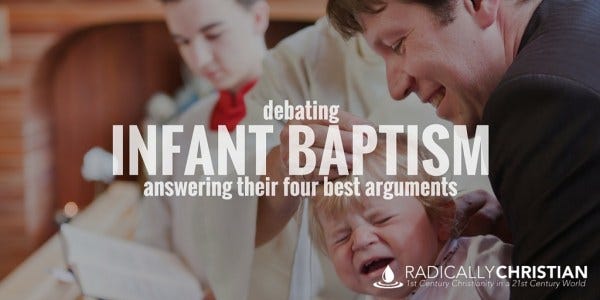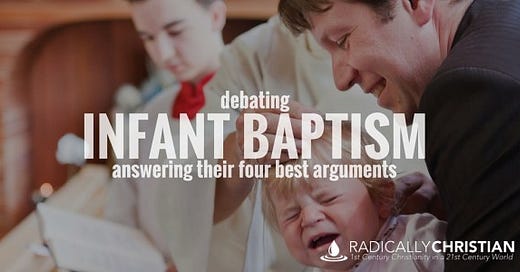I previously wrote an article on why it’s not biblical to baptize an infant. Because of that article, I was invited to join Presbyterian minister, Randy Booth on the Moody Radio program, Up For Debate to discuss the issue of infant baptism. After accepting this invitation, I took some time to educate myself about Booth’s position. I was actually surprised to learn I was mistaken in my assumptions about why many denominations baptize infants.

I mistakenly assumed infant baptisms were primarily done for the same reason, to wash away so-called “original sin.” While that’s the reason Catholics practice infant baptism, that is NOT why many Protestants do. Here are four of the Protestant arguments for the practice of infant baptism and why those arguments don’t hold up under the light of Scripture:
1. There Is Really Only One Covenant
On this first argument the second argument hangs. And it seems to me to be a fundamental misunderstanding about how to read the Bible. In his book, Children of the Promise: The Biblical Case for Infant Baptism, Randy Booth says the New Testament did not replace the Old Testament. His practice of infant baptism hinges on his belief that the New Testament simply flows out of the Old Testament. He believes the Old Testament still stands as God’s covenant with people.
However, Booth’s argument directly contradicts the book of Hebrews. The Hebrew writer gives several reasons why the new covenant is better than the old covenant. Take a moment to read Hebrews 8 and you will see it is clearly stated that the covenant Christ mediates is better than the old covenant “since it is enacted on better promises” (vs. 6). Going on to say, the establishment of this new covenant, “makes the first one obsolete” (vs. 13).
One of the hallmarks of the new covenant is that EVERYONE in the covenant community will know the Lord (vs. 11). Since Israelites came into the covenant community at birth, it was possible (and at times likely) they could grow up not even knowing the Lord. An Israelite could say to his neighbor and brother, “The Lord says…” and his brother could say, “Who is the Lord?” But under the new covenant, the only way to enter the covenant community (the church) is through a knowledge of the Lord (see Romans 10).
This, of course, eliminates infants from entering the covenant community until they reach an age at which they can know who God is and what He has done. Then they can respond in faith. This is the second and “better” covenant. The first covenant has been done away with.
2. Baptism = Circumcision (An Outward Sign)
Protestants (even those who immerse adults) almost all believe baptism is an “outward sign” that a person is under the covenant. They are right that covenants have signs or seals. Circumcision was the sign of the old covenant (see Romans 4:11). It was how God sealed the people who belonged to Him. The rainbow is another example of God’s covenant sign (see Genesis 9:13).
But baptism is NEVER called a sign or a seal of the covenant. The way God seals His new covenant people is with the Holy Spirit, not baptism. Paul wrote, “[You] were sealed with the promised Holy Spirit, who is the guarantee of our inheritance” (Ephesians 1:13-14; see also Eph. 4:30 and 2 Cor. 1:21). To say baptism is the New Testament seal or “sign” of the covenant, is to directly contradict Scripture.
That I am aware of, there is only one verse in the whole Bible that makes any comparison between baptism and circumcision. But even in that passage, it is far from a one-to-one correlation. In Colossians 2:11-13 Paul uses two metaphors. He says in Christ we are spiritually circumcised AND we are brought from death to life. Baptism is NOT called circumcision in that passage, it is called a burial (see also Romans 6). It’s only when we’re buried with Christ in baptism, that we can be brought from death to life.
To say baptism is like circumcision, or to say it is the “sign” that we belong to God, is to say something Scripture NEVER says. Baptism is like the children of Israel crossing the Red Sea (see 1 Corinthians 10:2), in which people go from being slaves to being free. Once we have passed through the water, we are sealed by God as belonging to Him. The Israelites’ seal was circumcision, ours is the Holy Spirit.
3. Whole Households Were Baptized
When asked if he could show a biblical example of infants being baptized, Booth referred to the book of Acts. He believes that when Scripture says whole households were baptized, that included infants. But there are several big problems with that argument:
First, even Booth admits, there is no way to prove there were any infants in those households. So any attempt to argue for infant baptism from these passages is an argument from silence.
Second, the people in these households who were baptized, listened to the word being preached (Acts 10:44), spoke in tongues and praised God (Acts 10:46), repented of their sins (Acts 11:18), and rejoiced after their baptisms (Acts 16:34). These are all things in which infants could obviously not participate. So if there were any infants in these households, they were NOT baptized.
“But the Bible doesn’t say some in the households were baptized and some weren’t,” Booth might argue. The answer to that is found in passages like Mark 1:5, which says about John, “All the country of Judea and all Jerusalem were going out to him and were being baptized by him in the river Jordan, confessing their sins.” Although Mark recorded that all of Judea and Jerusalem were baptized, he obviously didn’t mean infants, because infants couldn’t confess their sins. He also didn’t even mean all adults, because the Pharisees rejected John’s teaching and baptism (see Matt. 3:4-10; 21:25).
Whether in a household or in a region, when all the people were baptized, it is all the people who had repentant faith.
4. Jesus Said to Let the Children Come to Him
Jesus certainly loves children. He told His disciples to become like children. He allowed the children to come to Him and He blessed them (Mark 10:13-16), but this simply shows Jesus’ tenderness and mercy. It does not prove the case for infant baptism.
If anything, this episode shows that Jesus loves the innocence of children and they are already in God’s good graces. It is only as children learn more and more about the Lord – and equally as they find themselves growing more and more sinfully rebellious – that they must decide if they will submit themselves to Jesus, repent of their sins, and be immersed in water for the forgiveness of their sins (Acts 2:38).
Bottom Line
Baptism is an immersion in water as an expression of repentant faith in Jesus. It is the God-ordained way for a person to clothe themselves with Christ (Galatians 3:26-28), have their sins washed away (Acts 22:16), and be saved (1 Peter 3:21). There is simply nothing in Scripture to support the case for infant baptism. I encourage you to read more about baptism here.
I love you and God loves you,
Wes McAdams
The post Debating Infant Baptism: Answering Their Four Best Arguments appeared first on Radically Christian.





Excellent article! Well researched and articulated. Good work. It is helpful.
Good luck taking baptism from the most innocent when it's a free gift given to the most vile. At least you got your priorities straight